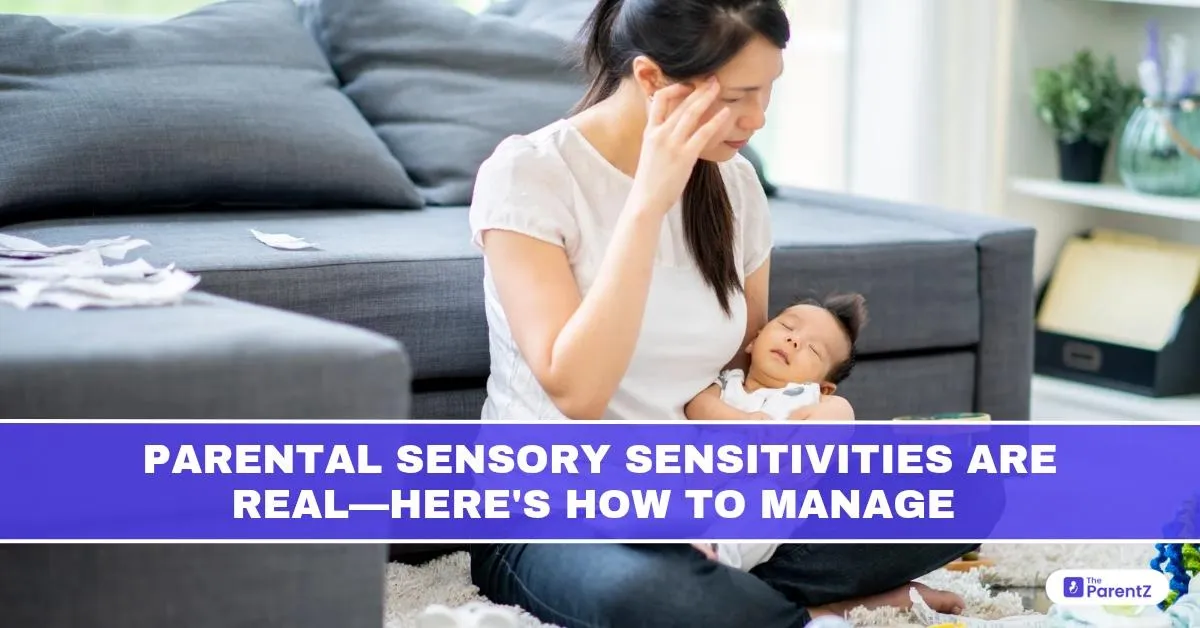Ever found yourself snapping at your child just because the house was too loud, the toys too scattered, or the lights too bright? You’re not “too sensitive.” You may be experiencing sensory sensitivities, a genuine neurological response to sensory input that becomes overwhelming.
While sensory processing issues are commonly discussed in the context of children (especially those with autism or ADHD), many parents themselves experience sensory overload, especially during the early years of caregiving.
What Are Sensory Sensitivities?
Sensory sensitivities refer to increased or decreased tolerance to sensory input like sound, light, touch, smell, or even movement. In medical terms, this relates to how the nervous system processes sensory data.
- Hypersensitivity (over-responsive): Everyday sounds or lights feel amplified or irritating.
- Hyposensitivity (under-responsive): Some may crave intense input like loud music or movement.
In parents, hypersensitivity is more common, especially to auditory and tactile input, think screaming, messy hands, constant touching, background noise, or toys clattering.
Why Are Parents More Prone to Sensory Overload?
Parenting adds layers of constant, unpredictable sensory input, with little downtime. Factors that heighten sensitivities include:
- Sleep deprivation: Diminishes nervous system tolerance.
- Hormonal shifts: Especially postpartum, perimenopause, or postnatal periods.
- Mental load: Multitasking, emotional labor, and decision fatigue intensify stress responses.
- Neurodivergence: Undiagnosed ADHD, autism, or anxiety may play a role in how parents perceive sensory data.
Even parents without a formal diagnosis may still struggle with chronic overstimulation, especially if they’re more introverted, anxious, or sensitive by temperament.
Common Signs of Sensory Overload in Parents
You may be experiencing sensory overload if you often feel:
- Irritated by loud or repetitive sounds (toys, cartoons, chatter)
- Startled by sudden noises
- Triggered by touch (sticky hands, clingy hugs, rough play)
- Overwhelmed by visual clutter
- Needing to escape even briefly to a quiet space
- Tense or anxious in noisy, crowded environments
These reactions aren’t character flaws; they’re nervous system cues that you need a reset.
Strategies to Manage Sensory Overload as a Parent
1. Start With Awareness, Not Shame
Recognize that your brain is simply overwhelmed, not failing. Avoid internalizing guilt. Acknowledge your limits with compassion and curiosity, not criticism.
“I’m not a bad parent. I’m a parent who needs quieter moments.”
2. Design a Sensory-Friendly Home Environment
- Minimize clutter: Visual chaos can increase stress. Rotate toys and simplify décor.
- Reduce noise: Use rugs, curtains, or white noise machines to soften sounds.
- Soothing lights: Replace harsh white lights with warm lamps. Avoid flickering screens.
- Create calm zones: Designate a sensory-safe corner for yourself or your child.
3. Use Sensory Breaks Proactively
Take 5–10 minutes during the day to reset your sensory system:
- Sit in silence
- Do deep breathing with eyes closed
- Use noise-cancelling headphones
- Step outside for sunlight and grounding
- Chew something crunchy or sip a warm drink for oral input regulation
These breaks are not luxuries. They’re nervous system nourishment.
4. Set Sensory Boundaries Without Guilt
Teach your children, even toddlers, that you also have needs. For example:
- “Mama’s ears need a break. I’ll talk with you again in 5 minutes.”
- “Let’s use quiet voices during puzzle time.”
- “After I finish my coffee quietly, we’ll play together.”
Children learn emotional regulation and respect for others’ space by watching you model it.
5. Incorporate Sensory Self-Care into Daily Routine
Include small rituals that calm your senses:
- Aromatherapy during your shower (lavender, bergamot)
- Soft music while folding clothes
- Comfortable textures in your clothing
- A calming bedtime wind-down routine for yourself not just for your kids
Even micro-habits reduce baseline stress and improve sensory resilience.
6. Manage External Noise Creatively
If ambient noise is a major trigger, try:
- Playing calming background music to mask sudden sounds
- Using wireless earbuds during noisy chores
- Teaching kids quiet activities (drawing, audio stories, puzzles) during overstimulating times
When to Seek Professional Help
You should consider reaching out to a therapist, occupational therapist, or mental health professional if:
- Your sensory overload frequently leads to yelling, irritability, or shutdowns
- You feel trapped, resentful, or emotionally numb
- You suspect underlying neurodivergence (autism, ADHD, SPD)
A professional can help assess whether sensory processing issues are part of a broader picture and guide you through coping techniques or therapeutic interventions.
Supporting Neurodivergent Parents
Many parents of neurodivergent children are neurodivergent themselves, often undiagnosed. If you’ve always felt “extra sensitive,” struggled in noisy spaces, or been called “dramatic” or “high-strung,” it may be time to explore your sensory profile too.
Learning about your own sensory preferences can help you:
- Communicate more clearly with family
- Make sustainable routines
- Build empathy for your child’s regulation struggles
Final Thoughts
Parental sensory sensitivities are real and valid. In a world that glorifies multitasking and emotional self-denial, it’s radical and healing to say: “My nervous system matters too.”
Taking care of your sensory well-being is not selfish. It is foundational parenting. When your senses feel safer and soothed, you show up with more patience, presence, and joy for your child and yourself.
References
- Dunn W. The Sensory Profile Manual. The Psychological Corporation.
- Brackett MA, et al. Emotion Regulation in Parenting, Yale Center for Emotional Intelligence.
- American Occupational Therapy Association – Sensory Processing in Adults
- Bogdashina O. Sensory Perceptual Issues in Autism and Asperger Syndrome
- Aron, E.N. The Highly Sensitive Person: How to Thrive (1997)





Be the first one to comment on this story.